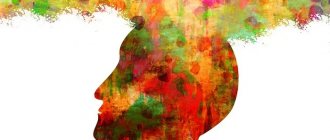Hello everyone, dear friends! Writes Lyudmila Redkina. They say happy hours don't watch. Have you ever had such a feeling in reality? I remember when I went to the park with my loved one, time flew by very quickly and unnoticed... It was truly a state of happiness, but it quickly ended and everyday life began. But why does this happen: all their lives people strive to achieve this very state, but it still doesn’t come? In this article we will try to determine what happiness is for a person - a process, a goal or moments - and how it is expressed.
What is happiness
Happiness is a state of inspiration and harmony when you experience joy and delight in everything that happens in your life. Each person experiences happiness from different things - some need a lot of money to enjoy a new day, some are happy when their child takes his first steps, and for others it is enough to look out the window and see the sunshine.
However, there is one condition in order to call oneself a happy person - the ability to enjoy everything that happens to us now, without looking into the future and without hoping that someday “everything will be better.” They say you are born happy, but can't we learn to be happy? Let's look at this issue.
General contentment does not mean that a person has absolutely everything that life can give, but that he has something important to be happy about. And happiness is a long-term state (happy childhood, happy old age, happy life), and not a short-term reaction, which we prefer to call joy.
The Oxford English Dictionary agrees. Happiness is the state of being happy. The famous French dictionary Larousse disagrees with this: happiness is a state of complete satisfaction (bonheur - état de satisfaction complete). Note that the origins of the word "happiness" in French are very humble: bonheur is simply bon heur, or good hour. Apparently, in the past, people were more modest and did not demand too much from life.
Two main questions have been bothering people for a long time. Firstly, is it even possible to be happy, that is, is it possible to be happy for a long time, preferably throughout one’s life? Second: if this is possible in principle, then what needs to be done to achieve this. It is not surprising that all sciences dealing with human life have addressed it in one way or another.
What is happiness: a scientific approach
It is paradoxical, but the final answer to the question of what is more in life - happiness or unhappiness, and whether a long and happy life is even possible, was not given by theologians, not philosophers, not psychoanalysts or psychologists. It was given by physicists. But not ordinary physicists, but biothermodynamic physicists (Ilya Prigozhin, Erwin Bauer, Alexander Zotin). This is very interesting, so let's pause for a moment on this point.
In general, thermodynamics studies the exchange and transformation of energy in complex systems. For example, what should be the size and temperature of the radiator to keep the room warm in winter. That's it in a nutshell. Of course, thermodynamics also deals with more complex systems.
A person is a complex self-organizing system. It also exchanges matter and energy with the outside world. To do this, we must take something from the environment and give something in return. School definition textbook - life is based on metabolism. Therefore, in the mid-20th century, many physicists working in the field of thermodynamics began to study biological systems. At the intersection of these sciences, a new field arose - biothermodynamics.
And here a logical question arises: if life itself is designed in such a way that it can and should bring us chronic pleasure, then why does this often not happen? Recently, scientists have been working to answer this question. There were also successes. With the advent of Gestalt psychology and Gestalt therapy, it became clear that in order to enjoy life, the most important thing is to correctly organize only two basic processes: to get everything necessary for life and to get rid of everything unnecessary and interfering.
This is nothing new for any doctor. We inhale with pleasure and exhale with pleasure. We like to stay warm when it's cold and cool when it's hot. Plato wrote that “Medicine is essentially the science of the body’s desires to fill and empty,” and Hippocrates wrote that “medicine is addition and subtraction: taking away what is superfluous and adding what is lacking.” Unfortunately, psychologists, sociologists and educators are only beginning to understand the importance of these two basic life processes for happiness: aggression in the good sense of the word as the ability to get what you need from life, and elimination as the ability to reject and remove from life everything that interferes with it.
Issues of happiness were considered not only by psychologists and philosophers, but also by physicists and biologists
What is not happiness?
- Money, apartments, cars - all these things do not give happiness. Things in themselves cannot be happiness. If most people understood this, they would not spend most of their lives ending in deep disappointment.
- Sensual pleasures are also not true happiness. For example, sex, the pleasure of good food or alcohol, the joy of shopping - these are temporary pleasures, but without a feeling of true happiness.
- Read a sea of books, leaf through fashion magazines, fill your brain with information. This is what some people do, wanting to learn as much as possible in order to become happy. No one became happy, this has been proven over the years. The more a person saturates himself with unnecessary information, the more unhappy he becomes. A person's intelligence level does not affect whether he will be happy or not. There are many smart and erudite people in the world who feel deeply unhappy. In search of happiness, you should not stop at your professionalism and erudition.
- When it comes to talent, creative and talented people can also be unhappy. Some people believe that having talent is real happiness, but many famous and talented people, despite their qualities, are often deeply unhappy.
Already several hundred years ago, the sages said that a person’s happiness lies in peace with himself and complete harmony. We must learn to listen to our body and our mind. Understand what you need to feel happy - this is the true meaning of life. Don't live in vain hopes and dreams, don't let fears arise. A happy person is always calm, can sensibly assess his problems and troubles, and does not get hung up on them. Anxiety and any fears are not a problem for a happy person; he appreciates every minute he lives and enjoys the beauty of the world around him.
If life for you is a black and white movie and you see only the negative in all events, then do not expect to become a happy person after acquiring a material thing. Surrounding yourself with luxury items is not the answer. The solution is to figure out what makes you unhappy.
A person who is internally calm easily gets out of the most difficult situations and is not afraid of problems. You must understand that money often solves many problems, but your sense of happiness does not depend on these very problems. Think about it, there are probably people around you who often smile and enjoy even the little things. And then there are people who are sad because of small problems and often become depressed. And the worst thing happens when a person who does not feel happy seeks solace in alcohol or drugs.
Definitions of happiness from great people
Great people became great because they achieved success in life and became famous for something. I don't know how happy they are, but they definitely know how to feel and achieve. Being a great, famous person is a great test, and not everyone is able to pass it with dignity. Therefore, they defined this complex concept of happiness, based on their experience, their observations.
Let's see what it is in their understanding:
- “Many seek happiness in areas above their level, others - below. But happiness has the same height as a person.” — Confucius.
- “The great science of a happy life is to live only in the present.” - Pythagoras.
- “You must believe in the possibility of happiness in order to be happy” - Leo Tolstoy.
- “Everyone chases happiness, not noticing that happiness follows him.” - Bertolt Brecht.
- “Time, money... Happy is the one who does not count either one or the other.” - Aleksey Ivanov.
- “In the construction of human happiness, friendship builds walls, and love creates a dome.” - Kozma Prutkov.
- “The greatest happiness in life is the confidence that we are loved, loved for who we are, or in spite of who we are.” - Victor Hugo.
- “Happiness is not limited to having money, it lies in the joy of work and achievement.” — Franklin Roosevelt.
- “A man’s happiness or unhappiness is largely the work of his own hands.” - John Locke.
- “A slacker can never enjoy complete happiness; You will always find traces of discontent and apathy on the face of a slacker.” — Heinrich Goethe.
- There is no happiness without an admixture of unhappiness” - W. Shakespeare.
- “Nine-tenths of our happiness depends on health” - Arthur Schopenhauer.
- “If happiness consisted only in bodily pleasures, we would call happy the oxen that find peas to eat.” - Heraclitus of Ephesus.
- Happiness is like fairy-tale palaces, the doors of which are guarded by dragons, and you have to fight to take possession of them” - Alexandre Dumas.
- “Unhappy is he who cannot forgive himself.” - Publius Syrus.
- “People can only be happy if they do not consider happiness as the goal of life.” — George Orwell.
- “To enjoy happiness is the greatest blessing, and to be able to give it to others is an even greater one.” — Francis Bacon.
- “One of the main signs of happiness and harmony is the complete absence of the need to prove anything to anyone.” — Nelson Mandela.
- “Happiness is like health: when you don’t see it, it’s there.” - I. Turgenev.
- “Happiness lies not so much in possession as in the process of mastering the object of our desires. For us to be happy, our happiness must always lack something.” — C. Helvetius.
This is the insight of great minds. You may not agree with something. But every statement has its own truth. I think each of these quotes are written from life experiences and failures.
Happiness is in our hands
If we know what the stable functioning of the endocrine system and, accordingly, high levels of certain hormones in the body depend on, then nothing prevents us from keeping our happiness under control. This is what, according to experts, can provoke a constant release of endorphins into the blood.
Nutrition
Foods such as bananas, bell peppers, potatoes, rice, hard cheese, ice cream, chocolate, and nuts increase the production of happiness hormones.
Way of thinking
Think positively, learn to enjoy simple things, maintain a positive attitude, and your hormonal system will work smoothly. Meditation, affirmations, and prayer will help change your attitude towards the world and yourself.
Sport
They say that the release of endorphins occurs at the 30th minute of running, or swimming, or fast walking. Engage in physical activity regularly, and the “happiness” system will work like clockwork.
Sex
But not just sex, but sex with orgasm. At the same time, a powerful release of endorphins occurs.
New impressions
Visiting the theater, watching movies, reading, traveling, walking - everything that is interesting contributes to the increased production of happiness hormones.
Acupuncture
To do this, it is not at all necessary to contact acupuncturists. It is enough to buy a Kuznetsov or Lyapko applicator and regularly lie on the thorns. Within twenty minutes, morphine-like substances - endorphins - will begin to enter the blood.
Sunbathing
Why is the memory of a hot summer always accompanied by pleasant sensations throughout the body? Because ultraviolet radiation enhances the synthesis of the corresponding hormones.
music and dancing
Beautiful melodies and dance moves also help in achieving a blissful state.
Well, now, having analyzed a lot of sources, we at least know which direction to move in order to exclaim more often: “Oh, God, how happy I am!”
What factors determine
The definition has been given, cut with a knife, but what is it? And here psychologists gave us the answer! Read the contents of our pie called “happiness”.
External environment
Let's start with the smallest ingredient. Only 10% of our well-being depends on the external environment. It's where we were born, what family we were born into. In short, everything that we initially have no control over and cannot change. But in adulthood, these factors are the easiest to change.
Personality
Here it will be upbringing, character, genes. Do you have friends who are always happy or always unhappy? It's all about character traits.
These factors are established at birth and are influenced by parents and the environment. You can change them by changing your environment, working with a psychologist, or working through them on your own. All in your hands.
Remember that 45% of your happiness depends on your thoughts and emotions. For some people this rate is even higher, so never ignore your individuality if you feel unhappy.
The concept of happiness is individual for each person
Self-realization
And the last point is approximately the same percentage as for personal qualities. Your satisfaction with your work, the results and the overall process is the key to your happiness. How can you be happy if you spend 5 days at a job that you don’t like, and on the weekends you watch TV and have no entertainment?
It doesn't work that way, think back to when you were young and dreamed of skydiving and book your spot for next weekend! Your accomplishments, your enjoyment of them, and the entire process are extremely important.
What about money?
You've probably already heard that the most frequent clients of a psychologist are rich people? There could be many reasons for this. For example, through hard work a person has isolated himself from others. Or, for example, he does not know how to hear what he wants, and simply does what his parents told him. Money is just a tool to achieve your goals.
Money alone will not make you happy. But, as the joke goes, “crying in a Porsche is much more comfortable than riding a bicycle.” And it’s more convenient to pay a psychologist without compromising basic needs. Therefore, harmony is important here.
By the way, according to sociological research, there are more happy people among poor people and people living in poor countries. Money gives you a feeling of happiness. But only as long as you strive to ensure that your physical needs are fully met - medicine, housing, education and predictable government action.
When you start earning more than you need to live, money itself doesn't bring you pleasure. It's all about what you spend it on. How many people actually have financial knowledge? To summarize, we can say that big money drowns out our more subtle needs. Or maybe not? Write your opinion!
Children's happiness and its reasons
Children cannot make decisions on their own; they live under the constant control of their parents, and perceive the world around them under their influence. First of all, it depends on them whether their child will be happy, or will begin to feel flawed, unsure of himself, and complex.
In childhood, every word heard from adults is taken seriously and remembered for life . Some parents make the grave mistake of instilling in their children that they must prove in their lives that they are worth something, otherwise they will remain “nobody” and “nothing.” This approach is dangerous because the child will develop the destructive opinion that he is incapable, weak, a real “Nobody.” Moreover, this belief can “linger” with him until adulthood. Do you think he can become truly happy?
If scandals or showdowns occur in families, it is the children who suffer from this, first of all . The child believes that he is the culprit of what is happening, and he begins to develop first a guilt complex, and then an inferiority complex. Children perceive all situations differently from adults, and therefore their happiness depends primarily on the attitude of their parents towards them.
If you instill in a child that he is capable, smart, that he is loved and cared for, then he will treat himself with sufficient self-respect, and it is quite possible for him to become happy in adulthood . A child’s happiness is to feel needed, loved, desired. If all parents understood this, humanity would have entire generations of happy people.
How to measure happiness?
One of the simplest ways to measure life satisfaction was proposed by psychologist Ed Diener. Using a scale from 1 to 7, please indicate the degree to which you agree with each of the following five statements. Rate 1 for strongly disagree, 3 for strongly disagree, 5 for strongly agree, and 7 for strongly agree. Try to answer honestly and truthfully.
- In many ways my life is close to my ideal.
- The circumstances of my life are wonderful.
- I'm happy with my life.
- There are things in my life that I really need.
- If I could live my life over again, I wouldn't change much.
Now add up all five numbers and get a total score: it should be between 5 and 35. This test shows how satisfied you are with your life. A score of 15 to 25 is considered average, a score below 14 is considered below average, and a score of 26 to 35 means you are likely satisfied with your life.
Can medications make you happier?
Can modern pharmacology help us become happier? The new generation of antidepressants works differently. A new generation of antidepressants and anti-depressants helps those who lead an active lifestyle, work very hard and cannot cope with fatigue - a consequence of overwork. Antidepressants allow them to be calmer, look at life more soberly, react adequately to what is happening and not throw out their emotions. But do they make a person happier? It’s unlikely: not a single pill can solve the problem of the emptiness of human existence or fill your life with meaning.
Rules for the life of happy people
Happy individuals, regardless of age and place of residence, follow similar rules:
- live in the moment;
- avoid envy;
- have hobbies;
- love travel, new experiences;
- are attentive to loved ones;
- lead a healthy lifestyle;
- make friends with positive people;
- avoid comparisons;
- set the right goals.
Happy people are not afraid of loneliness and silence. They enjoy self-discovery as much as communication, finding new opportunities where others see obstacles.
Examples of happiness from life
Let me start with a counterexample. Everyone remembers the famous Russian fable about the fish and the fisherman. What ultimately killed the old woman? Her dissatisfaction, her inability to enjoy and be happy with what she has. Having gained youth, a palace and wealth, at heart she remained a miser and a muttering bitch. And she returned to her rotten trough.
Another argument from literature can be Pushkin’s poem “Ruslan and Lyudmila” - here the heroes overcome obstacles and achieve one goal - to unite their loving hearts. It is after achieving this goal that peace, joy and complete satisfaction with the present moment comes.
In various programs we can see examples of true bliss when “amateurs” perform complex dance acrobatics, vocal episodes or musical passages.
About six months ago I was talking to a girl who had gone to Uganda as a volunteer. She told me that they only ate 4 meals every day and never ate anything else. How happy they were when they had mashed potatoes, stew and pizza. For them it was real happiness.
For my children, the greatest satisfaction in life comes at the seashore, or when they are fooling around with their dad, or when their favorite crab stick salad is on the table! In general, I noticed that it is much easier for children to feel happy than for adults.
And finally, two examples of famous people:
- Andrey Grigoriev-Appolonov, 44 years old, lead singer of the musical group “Ivanushki International”: “It’s simple. For me, happiness is loving and being loved.”
- And for Ben Carson, happiness was the carrying out of the world's first operation to separate Siamese twins.
And there is no shortage of examples of people striving to achieve something important, and they achieve it when they love, feel loved and are healthy.
There is no one-size-fits-all recipe for happiness
How to become happy and successful
In reality, becoming a happy person is a complex process. And it is obviously not aimed at achieving any material benefits or special social status.
When it comes to happiness, harmony with oneself is always assumed. Only a person who hears and understands himself can be happy. So here's what you can do:
- Engage in self-development. Explore your capabilities and talents;
- Express yourself - don’t be shy about your desires and fantasies;
- Try to understand and hear yourself - understand what your inner “I” wants;
- Work in a job that you enjoy;
- Surround yourself with people you like or admire;
- Don't be afraid to cut ties with those who make you uncomfortable;
- If you have injuries and post-traumatic syndrome, work through these issues with a specialist;
- Eliminate your complexes and internal clamps.
Two paths to happiness
Modern psychologists believe that two paths lead us to happiness: one is connected with events in the external world, the second is with our inner sense of self. When we build a house, buy a car, travel, make a career, achieve success, we follow the first path. By doing all of the above, we experience happiness, but it does not last long. After some time, achievements become habitual, and we need a new portion of pleasure. So you can spend your whole life chasing happiness, now experiencing it, now cooling down again, and in the end you understand that things are not capable of bringing true happiness.
The second path helps you find happiness in your soul. This is a very deep and complex experience that is associated with achieving inner peace, harmony and balance. This inner state gives a feeling of quiet joy from simple things, from every day, from the fact that we exist.
So, true happiness is the balance of the first and second, the balance between the external and internal world, the successful manifestation of oneself in life and the achievement of internal harmony. And this is also the joy that lives in our hearts.











